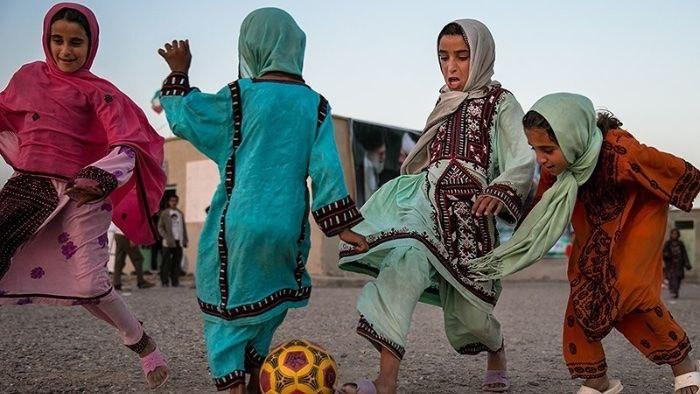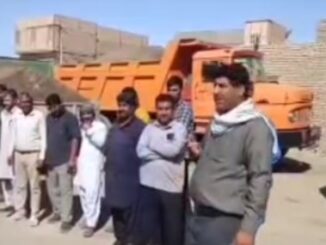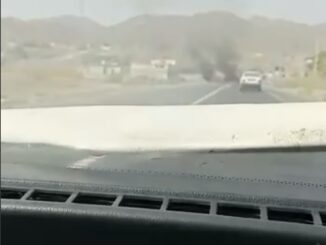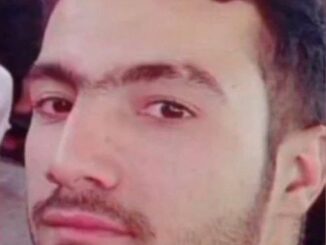
Balochis have faced government discrimination, both as Sunni religious practitioners and as an ethnic minority group, according to several international reports. According to Baloch activists, the Iranian State controls and imposes many restrictions on their religious activities, resulting in refused national identity cards for their children. Many Baloch people are harassed or beaten, and many are forced to leave their homes and find another place to live.
Nasser Boladai, spokesperson for the Balochistan People’s Party, talks with MvoicesIran about the challenges of the two million-strong Baloch minority, who live in the undeveloped area near the border with Pakistan and Afghanistan.
For years, thousands of Baloch children were deprived of their national identity card due to both Iranian law refusing citizenship to children born to Iranian mothers and foreign fathers and a systematic discriminatory policy regarding the Baloch people, such as confiscation of Iranian identity cards to “reexamine” them. Recently, this law was changed to grant citizenship to children , but Iran’s Islamic Revolution Guard Corp (IRGC) still has the last word regarding security concerns. What is your evaluation of how this new law may impact lives in Balochistan in reality? And how can IRGC be an obstacle to this improvement for Baloch children?
Unfortunately, even the mild reform sought by this new law has not yet not been implemented. Three facts have delayed this policy’s implementation in Balochistan. One is the regime’s plan for demographic manipulation to make the Baloch a minority in their own region. In June 2014, Mr. Akbar Torkan, the head of the Free Zone Areas of Iran, announced that the government plan is to triple the population in the Balochistan coastal area by moving ten million people from other parts of Iran within the next 15 years. To implement this plan, the regime needs to create circumstances that minimize the Baloch population in Balochistan.
Another reason is the control of the Balochistan administration by the Revolutionary Guards. The Makran coast is used for illegal trade by the Revolutionary Guards and in their foreign policy to export the revolution to neighboring countries. It is also used for the drug trade, which benefits the Revolutionary Guards.
Another reason is the current discussion, over a 25 -years deal between Iran and China . A large part of this investment and contract concerns Balochistan and its coastline. All of these connections have created a situation in which the regime considers Balochistan and the Baloch [people] a security concern. The regime and particularly the Revolutionary Guards are delaying the implementation of this policy. As a result, [the policy] probably will never be implemented for the Baloch people.
According to several international reports, “residents of provinces containing large Sunni populations, including Kurdistan, Khuzestan, and Sistan and Balochistan, reported discrimination (including suppression of religious rights), denial of basic government services, and inadequate funding for infrastructure projects.” Why does the Islamic State treat Sunni citizens as “non-citizens” or “second rated citizens” at best? May you cite an example of the suppression of religious rights and the denial of basic government services that any state must provide for its citizens?
Article 12 of the Constitution states: “The official religion of Iran is Islam and the Twelve Ja’fari School of Thought and this principle shall remain eternally immutable”. This explicit endorsement of a school of Shia Islam alienates the majority of Kurds, Turkmen, Baloch, and a large number of Arab people, who practice Sunni Islam. Tehran has a population of more than 1 million Sunni Muslims, but it has not yet granted permission to plan for a Sunni mosque; all applications for building a Sunni place of worship have been rejected and/or ridiculed. Article 115 excludes non-Shias from holding the office of the Republic’s president.
In its effort to suppress all kinds of challenges to its rule, the regime assassinated one activist and arrested another, blaming them falsely for committing a crime in which they were not involved. They were arrested and forced to confess under torture, and their confession was broadcast on TV.
Conversion to the Shiite religion is encouraged, while conversion to the Sunni religion is punished. The central government in Tehran has historically used all means to convert non-Shiites to the Shiite religion using such methods as intimidation, incentives like giving them a job, and providing them other social privileges.
Those who convert to the Shiite religion are hailed as heroes who have taken the right path, and they are brought on state TV to tell their story; and show how the Shiite Imam appeared to them, but also to condemn Sunnis. On the other hand, people who convert to Sunni from Shiite are arrested and treated as “Murtad”, meaning rejectionist, which is punishable by death or imprisonment unless they repent.
A religious selection process called “Gozinesh” in Farsi requires persons to demonstrate their allegiance to the Islamic Republic to be admitted to higher education or [to hold] a job as a civil servant. This is one of the reasons why unemployment among Baloch youth is very high.
In one of your interviews, you mentioned the policy of depopulating the Baloch people through inadequate funding for infrastructure projects and bringing in people from other parts of the country to develop the projects rather than using local forces. How does such a policy continue now and how do you evaluate its impact on the local population?
On 11 May, 2020, according to Rasank, Iranian security forces destroyed many homes of people in Safidak, a suburban village of poor Baloch people near Zahidan City, showing permission from high -ranking authorities in Tehran .
The published videos show that they were armed with all kinds of weapons to terrorize residents and that they asked people to move away while using huge bulldozers to destroy buildings.
On 7 May, 2020 in Chabhar Port City, while COVID-19 was increasing in Balochistan,, people in the Jangalok village, a small suburb settlement of poor Baloch poor people in Chabahar City, were under constant pressure by the Iranian regime’s intelligence and security forces through the Chabahar City authorities, to evacuate and move away voluntarily. This pressure has continued for a long time, but the residents have been united in their resistance, because they have lived there for generations, pursuing traditional involvement in fishing from the sea and other daily wage labor. However, on 7 May, 2020, a fire, that all signs indicate was staged and, managed to erupt and burn all of the houses there to the ground.
In this situation, the grieving families were promised new homes in another place. Like other promises made by this government, however, this promise to the local poor Baloch people will never be kept.
On 21 April, 2020, Baloch homes in Chabahar in the Mirabad area were demolished, as occurred in Chabahar. Their homes were demolished, and they were forced to leave their homes without being provided any other facilities. They were pressured beginning in 2019 to leave their homes, and attempts were made to demolish their homes on 16 May, 2019, but most people were at home at that time and united resisting the demolition. However, this time, the demolition took place when most of them were outside of their homes.
On 13 April, 2020, in Baghdani, a suburban village of Iranshahr City, a few homes and lands were confiscated.
During all of these reported incidents of destruction and the resulting homelessness, despite the instructions and advice of health authorities and experts about the spread of COVID-19, no physical or social distancing was followed, and no shelter was provided to the affected people.They had no choice but to seek help from relatives, friends or local NGOs….
We ask the international community to pressure the Iranian regime to allow international humanitarian organizations, such as the Red Cross and Doctors Without Borders, to provide medical help to the Baloch people.
All of these harassments during this time of coronavirus are part of the Iranian government’s ongoing policy of pressuring the Baloch people to move out of their homes and get exposed to COVID-19 in order to advance its policy on Balochistan overall and, especially, its long coastal region’s demographic manipulation policy.
For many who do not face ethnical and religious discrimination, it is sometimes difficult to imagine how life becomes bitter and intolerable for the victims of religious discrimination? For example, imagine a child just born in Balochistan, what would be his/her challenges as a Sunni Baloch in Iranian society?
In their early lives, the Baloch people face discrimination. Baloch children encounter several problems when they start school. First, the medium of education is not in their mother language. Other problems are the lack of schools and the poor conditions of those that exist. Village children have to travel or walk for miles to get to schools with poor or inadequate facilities, and families do not have the means to provide for safe transportation. Girls, in particular, find it difficult to continue their studies; more than 60% percent drop out after primary school. Financial and traditional concerns mean that families’ limited resources are not spent on educating girls.
In higher education, the national selection criteria offers Baloch youth a very low chance of acceptance at universities, which yet again reduces the national interaction and access to better education and consequently leads to unfair competition in the job market and employment opportunities.
Even the jobs created in Balochistan go to people who are not Baloch and are not local. The general consensus is that unemployment is particularly high in the region, which is of great concern. Discrimination based on religion and belonging to the Baloch ethnic group is high. Consequently, more than 70 percent of people in Balochistan live below the poverty line.
There is a discourse among many Iranians, including people who are against IR policy, that there is a strong tendency of separatism among Balochis. Such discourse has some direct consequences to overlook the situation in Sunni -populated areas. How did such discourse get its roots, and how can Sunni minority respond to it?
Years of neglect and a combination of political, economical, cultural, and social discrimination has created a sense of alienation from the state. There is no doubt that the Iranian government’s creation of a nationwide identity based on one nation’s sense of national identity has created a rift between the Baloch people, who do not feel that their sense of identity is included in the national identity. Given that Iran opposition groups have no inclusive policy to include national minorities like Balochs in the state and country’s identity in their plan if they come to power, this has minimized the hope for an inclusive policy in Iran. So there is a tendency and a political movement that feels that to avoid all form of discrimination, secession is the only option.
However, there is also a movement that is currently much stronger than the secessionist, which envisages a democratic federal and secular structure to solve the problem with discrimination and to preserve a peaceful co-existence. This school of thought is represented and organized by the Balochistan People’s Party, which is a member of the Congress of Nationalities for a Federal Iran (CNFI). CNFI consists of Azerbaijani Turk, Arab, Baloch, Kurd, Lor and Turkmen political parties and is a movement struggling for a Democratic, secular and federal Iran.





Be the first to comment